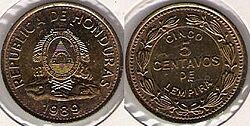Honduran lempira facts for kids
Quick facts for kids Honduran lempira |
|
|---|---|
| ISO 4217 Code | HNL |
| User(s) | |
| Inflation | 7.7% |
| Source | Central Bank of Honduras, June 2011. |
| Symbol | L |
| Coins | 5, 10, 20, 50 centavos |
| Banknotes | L1, L2, L5, L10, L20, L50, L100, L200, L500 |
| Printer | Polish Security Printing Works |
The lempira (sign: L, ISO 4217 code: HNL) is the official money of Honduras. It is divided into 100 smaller units called centavos.
What's in a Name?
The lempira currency is named after a brave leader from the 1500s. His name was Lempira. He was a cacique, which means a chief or ruler, of the Lenca people. The Lenca are an native group in Honduras.
Lempira is famous in Honduran stories. He led his people to fight against the Spanish conquistadors (conquerors). He is a national hero in Honduras. You can see his picture on the 1 lempira banknote. He is also on the 20 and 50 centavos coins.
A Quick History
The lempira was first used in 1931. It replaced the old money, which was called the Honduran peso. One lempira was worth the same as one peso.
In the late 1980s, two lempiras were worth about one United States dollar. For example, a 20-centavos coin was sometimes called a daime. This was because it had the same value as a U.S. dime. By April 2022, about 24.40 lempiras were needed to equal one U.S. dollar.
Coins of Honduras
Coins were first made in 1931. These included values of 5, 20, and 50 centavos, and 1 lempira. Later, 1, 2, and 10 centavos coins were added.
The 1 lempira silver coins stopped being made in 1937. Other silver coins, like the 20 and 50 centavos, were changed to a metal called cupro-nickel in 1967. The 1 and 2 centavos coins were last made in 1998 and 1974.
Today, these coins are still officially accepted as money:
- 1 centavo
- 2 centavos
- 5 centavos
- 10 centavos
- 20 centavos
- 50 centavos
However, people in Honduras rarely use coins for payments anymore. Most payments are made with banknotes.
Honduran Banknotes
The first lempira banknotes were printed in 1932. They came in values of 1, 2, 5, 10, and 20 lempiras. The Central Bank of Honduras started printing money in 1950. They added 50 and 100 lempiras notes that year. The 500-lempiras note was introduced in 1995.
In 2010, a new 20-lempira note was released. It was made from a special plastic material called polymer. About 60 million of these notes were printed.
A new 200 lempira bill was made to celebrate 200 years of Honduras's independence. This special note shows two scarlet macaws. These beautiful birds are the national bird of Honduras.
Here are the banknotes you might see in Honduras:
| Image | Value | Color | Who is on it? | What's on the back? |
|---|---|---|---|---|
 |
L1 | Red | Lempira | Copán ruins |
 |
L2 | Purple | Marco Aurelio Soto | Amapala island |
 |
L5 | Gray | Francisco Morazán | Battle of La Trinidad |
 |
L10 | Brown | José Trinidad Cabañas | Universidad Nacional Autónoma de Honduras (National University) |
 |
L20 | Green | Dionisio de Herrera | Presidential palace |
| L50 | Blue | Juan Manuel Gálvez | Central Bank of Honduras building | |
 |
L100 | Orange | José Cecilio del Valle | Casa Valle (Valle's House) |
 |
L200 | Turquoise | 2 Scarlet Macaws | Banco Central de Honduras |
| L500 | Violet | Ramón Rosa | San Juancito |
See also
- Economy of Honduras
 | James B. Knighten |
 | Azellia White |
 | Willa Brown |


